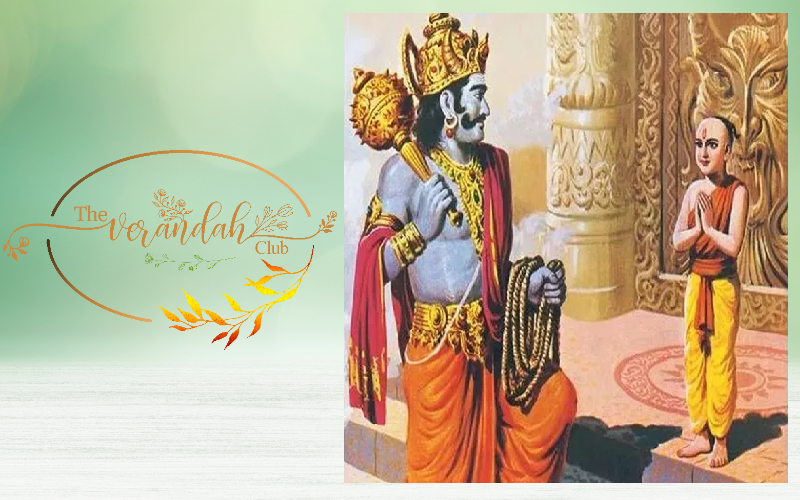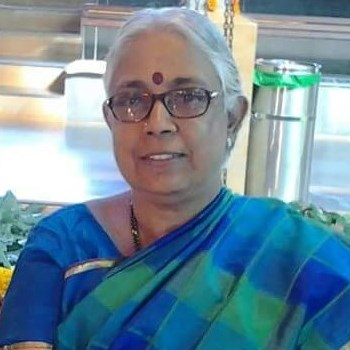Hero Story
B. Ramadevi
Nachiketa

Swami Vivekananda once said: "If I get ten or twelve boys with the faith of Nachiketa, I can turn the thoughts and pursuits of this country into a new channel.”
What made Swami Vivekananda say so? Who was Nachiketa? How and why did he impress the Swamiji so?
Read on…
Rishi Uddalaka had two sons. One was Shvetaketu and the other was Nachiketa. Shvetaketu was brilliant and his father sent him to a gurukula for gaining more knowledge. But Nachiketa, being an introvert, never showed any interest in anything. He hardly spoke and never demanded anything. But he was a great thinker and was growing internally. But his father considered him useless and kept him at home.
Once, Rishi Uddalaka performed a yajna named ‘Vishvajit’ to gain enough merit to reach heaven when he died. After the yajna was over, he started donating his cows.
It is difficult to understand why great people at times behave like ignorant ones. Rishi Uddalaka had performed many yajnas and had won the honor of being called ‘Vajashravas’ (meaning –– the one, famous for donations). That day, he donated the good cows to his relatives and friends but gave away the barren and weak cows to poor Brahmins. There was absolutely no use of those cows and Uddalaka would only earn demerits by donating them.
Nachiketa, the so called ‘good for nothing’ son, noticed this. He loved his father and was sad that his father was committing a sin by donating those cows. He went to him and asked, “Father! Is it not wrong to donate these barren cows? Are we not supposed to give only the good things to people?”
Rishi Uddalaka did not like this question. He did not give a reply. Then Nachiketa asked him, “Father! To whom are you going to give me?” Uddalaka chose to ignore his son’s question. But Nachiketa was persistent. When he repeated the question for the third time, the already irritated father shouted in anger, “I am giving you to Death”.
Nachiketa did not expect this. However, he collected himself and said, “All right, father! So be it.”
The father immediately realized his mistake and pleaded with his son. “I am sorry, my boy. I did not mean it. You don’t have to go to Yama.”
But Nachiketa said, “Father! I have always obeyed you. Your word is law to me. You should not take back your promise because of me.”
Then Nachiketa took leave of his father and set out towards Yamaloka. With great difficulty, he reached Yamaloka. But Yamaraj was not there. Nachiketa sat at the gates of his palace for three days till Yamaraj returned.
Yamaraj was surprised to see a little boy at his gates with a tired but glowing face. When he learnt that he had been waiting there for three days without food or water, he was filled with remorse.
Yamaraj apologized to Nachiketa and told him, “Son! I am sorry to have kept you waiting for three days without offering hospitality. I will give you three boons. Ask what you want.”
Nachiketa said, “Thank you, my lord! I want my father to forgive me and accept me when I go back to him.” Yamaraj said, “So be it! What do you want as your second boon?”
“My lord! Please teach me the techniques of fire sacrifice that will help me attain heaven.”
This was a little unexpected from a small boy. But Yama was pleased and taught him patiently all the mantras and rituals needed for the fire sacrifice. Nachiketa learnt it with great eagerness. Yamaraj said, “You are a great learner, Nachiketa! From today, the yajna made with Agni will be called ‘Nachiketagni yajna’ in your honor. I am also giving this necklace, studded with gems of different shapes, as my gift to you.”
Nachiketa thanked him and asked for his third boon. “My lord! I want to know the mystery behind death. What happens to the soul of a person when he dies?”
Yamaraj was stunned. He tried to evade that question. “Nachiketa! Even the celestials have not been able to understand this very well. It is very subtle and inexplicable. You will not be able to understand this. Please ask for another boon.”
Nachiketa said, “My lord! If that knowledge is so subtle, who else can teach me about the mystery of death better than you, the lord of Death? I want only this boon.”
Then Yamaraj tried to tempt Nachiketa with wonderful boons (there is an exceptionally long list) that will ensure his long and comfortable life in the earth. But Nachiketa was firm.
“O Lord! All the joys that you are ready to offer me are temporary, aren’t they? They diminish man’s strength and will certainly come to an end, one day. Wealth can never satisfy man. Keep all these with you. Do not try to buy me with these things. I do not want any of these. I want the knowledge of the Atman.”
Yamaraj was immensely pleased with Nachiketa’s strength of mind. He started teaching him Atmavidya.
“My boy! Man is attracted by good and bad things. An intelligent person chooses the path that will uplift him. The foolish one chooses the path of enjoyment and, is doomed. You have wisely chosen the correct path. No amount of temptation could make you swerve from your determination. Very rarely a teacher gets a student like you.
Now listen! By meditating on the Paramatma who resides in the hearts of the devoted, a person is freed from the bonds of enjoyment and suffering. Such a person has got the source of bliss and is eternally blissful.
I will teach you the significance of the letter ‘Ohm’ (ॐ). This letter is the final goal. The one who knows this and understands this, can have all his desires fulfilled. He also becomes one with the Brahman.
The atman is never born and never dies. It can neither kill nor get killed. It is smaller than the smallest and bigger than the biggest. It resides in the heart of every being in this creation. By having this knowledge, an intelligent person never grieves over anything. This knowledge cannot be achieved with education or effort. A person whose mind is at peace can achieve this.
The human body is like a chariot. The owner of this chariot is the Atman. The charioteer is the intellect. And mind acts as the reins that control the horses. The five senses are the horses that pull the chariot. Those who do not have control over their minds let their senses wander where they please and they take the body away from its aim. Those who have their minds under control do not let their senses go astray. They reach the abode of the Paramatma and are freed from the cycle of birth and death. There is nothing greater than the Paramatma and He is the final goal of the Atman.
Nachiketa! Arise! Awake! Understand the boons that you have received and make use of them.”
With these words, Yamaraj bade Nachiketa farewell. And Nachiketa returned to his father’s home as a ‘Jeevan mukta’.
Note:
There are references to Nachiketa in the Rigveda, Taittiriya Brahmana, and in the Mahabharata. However, the primary story, dealing with the dialogue between Nachiketa and Yama, comes from Kathopanishad (कठोपनिषद्).
Sources:
http://www.dnaofhinduism.com/ancient-wisdom-via-stories/story-of-nachiketa-yama-the-soul-brahman
https://vivekavani.com/swami-vivekananda-quotes-katha-upanishad-nachiketa/
https://www.youtube.com/watch?v=_qSchdy5j_w
https://www.youtube.com/watch?v=XdH-GOnCVI0
https://www.youtube.com/watch?v=_HnyxQvZ3A0

B. Ramadevi is a teacher of English and a freelance reviewer of music and dance. Being a polyglot, she gets inputs from various sources and loves to share them with interested people. She contributes articles for Verandah Club on characters from Indian scriptures and classics.